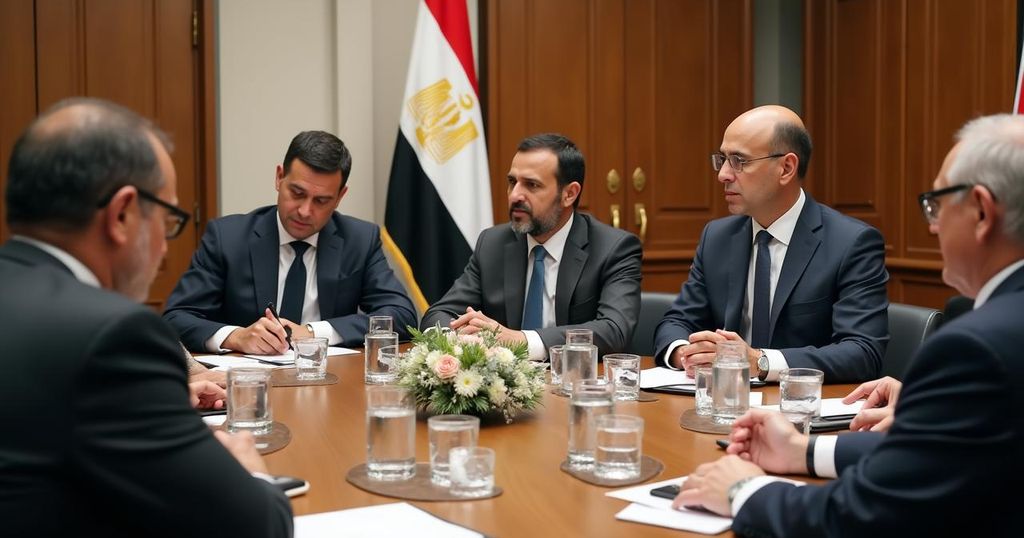Egypt has called for a reevaluation of the Cooperative Framework Agreement (CFA), also known as the Entebbe Agreement, which governs the management of the Nile River. Egypt and Sudan have rejected the CFA while upstream countries have signed it. Irrigation Minister Hani Sewilam emphasized the importance of cooperation among Nile Basin nations, affirming Egypt’s refusal to concede any portion of Nile water. President Abdel Fattah Al-Sisi remarked on the critical importance of water preservation for Egypt, as the Nile provides over 98% of its water supply. The construction of the Grand Ethiopian Renaissance Dam has heightened tensions in the region, with Egypt seeking binding agreements on the dam’s operational protocols.
Egypt has recently called upon the countries of the Nile Basin to reassess the Cooperative Framework Agreement (CFA), alternatively recognized as the Entebbe Agreement, which establishes the principles, rights, and responsibilities governing the management and development of the Nile Basin’s resources. The CFA has garnered signatures from upstream nations including Ethiopia, Rwanda, South Sudan, Uganda, Tanzania, and the Democratic Republic of Congo; however, it has been outright rejected by both Egypt and Sudan. At a water event held in Cairo, Irrigation Minister Hani Sewilam emphasized the importance of the agreement, stating, “We call on the Nile Basin countries that signed the Entebbe Agreement to review their position and return once again to discuss cooperation between countries in a way that does not harm any of the riparian countries.” He further reiterated that Egypt’s stance aligns with international treaties governing river management, insisting that discussions must include all nations to ensure equitable consideration of interests. Minister Sewilam articulated urgent concerns about Egypt’s water supply, declaring, “Egypt will not concede even a single cubic metre of Nile water and firmly rejects the Entebbe Agreement in its current form.” On the matter of Egypt’s reliance on the Nile, President Abdel Fattah Al-Sisi asserted that the preservation of water resources is fundamentally vital, noting that the Nile River constitutes over 98% of the country’s freshwater supply. This contentious issue is underscored by the Nile River’s significance, notably in light of the Grand Ethiopian Renaissance Dam (GERD) under construction by Ethiopia on the Blue Nile, which Egypt perceives as a potential existential threat to its water reserves. While Ethiopia regards the dam as crucial for its economic progress and assures that it will not affect the flow of water downstream, Egypt demands a binding agreement regarding the dam’s filling and operations. The CFA marks a significant multilateral initiative among Nile Basin countries to establish a legal and institutional framework for the management of this critical resource. The tensions surrounding the agreement, particularly between Egypt and Ethiopia, underscore the complexity of regional water politics and the pressing need for cooperative frameworks that respect the rights and needs of all nations involved.
The Nile River is a key resource for several African countries, particularly Egypt and Sudan. The Cooperative Framework Agreement (CFA), initiated by upstream nations, aims to provide a cooperative approach to managing the Nile’s resources but has faced resistance from Egypt and Sudan, who argue that it undermines their water security. The construction of the Grand Ethiopian Renaissance Dam (GERD) by Ethiopia has further escalated tensions, as Egypt fears it jeopardizes its water supply from the Nile. This situation necessitates urgent negotiations and a reassessment of agreements to ensure equitable and sustainable water management.
In summary, Egypt is urging the other Nile Basin countries to reconsider the Entebbe Agreement in light of its significant concerns regarding water security. The initiative seeks to foster cooperative dialogue to ensure that the interests of all riparian countries are respected, particularly as issues surrounding the Grand Ethiopian Renaissance Dam continue to intensify regional tensions. The preservation of the Nile River as a vital resource for Egypt remains a critical and pressing matter.
Original Source: www.middleeastmonitor.com






